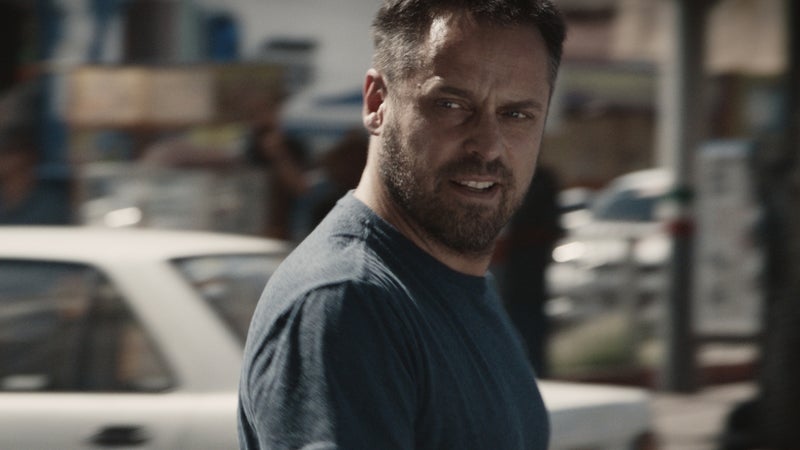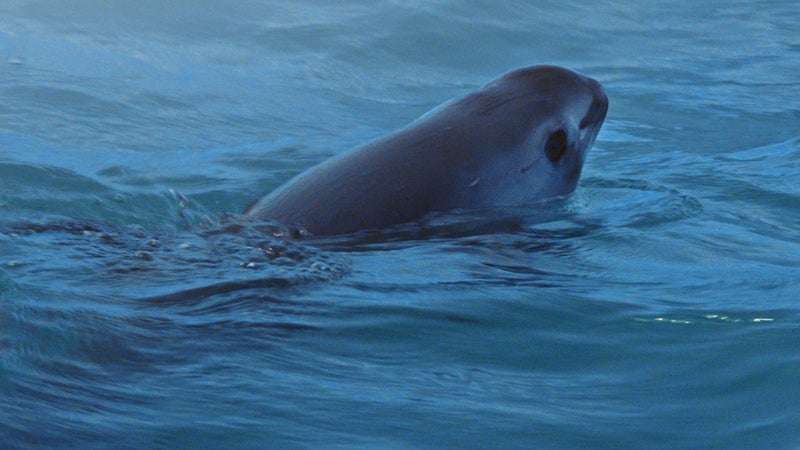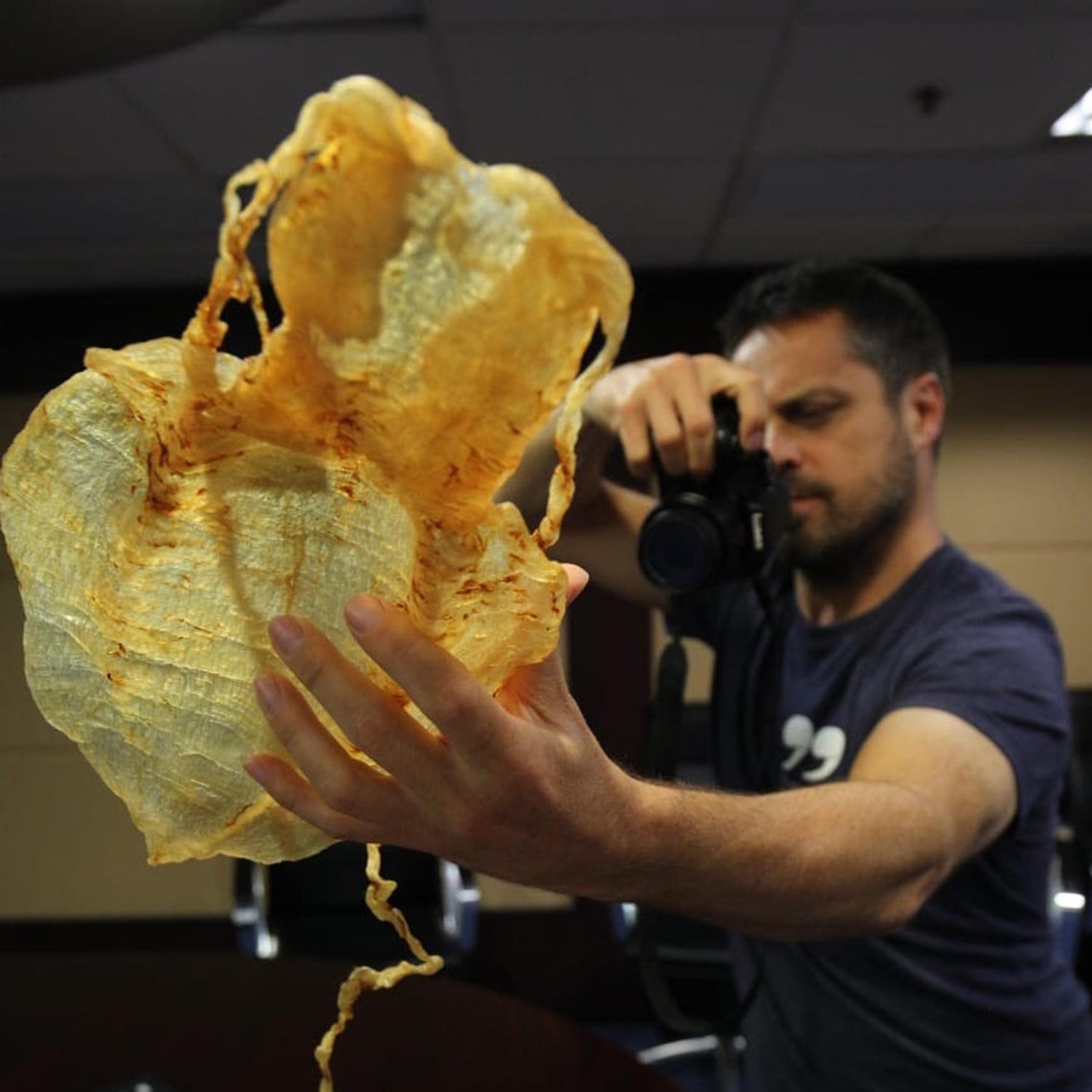“It’s like love,” Andrea Crosta says, looking over the Pacific as an early mist parts and the California sun creeps between clouds. The 49-year-old motions to Argos, his pit-Lab rescue from Tijuana, Mexico, named after the dog in The Odyssey, and they turn down the jetty. “When people ask why I care [about endangered species], I tell them it’s like love,” he says. “They have a right to exist.”
I can’t say where exactly we are, because Crosta’s work has made him more than a few enemies. As the founder of the Elephant Action League, he’s spent the last five years infiltrating and surveilling networks in Latin America, Africa, and Asia, where he and a team of ex-FBI and CIA agents, informants, and law-enforcement partners investigate wildlife crimes. Using hidden cameras and digital eavesdropping, he’s exposed the link between Al Shabab selling ivory to support jihads, found Chinese navy ships shuttling ivory, and gathered evidence that influenced how wildlife traffickers are prosecuted in Thailand and Africa.
To say this isn’t the norm in buttoned-up academia is a colossal understatement. In 2013, after two decades in the shadow world of security—protecting ships from Somali pirates and consulting with governments—he started the EAL. His work eventually caught the attention of Hollywood heavyweights like Leonardo DiCaprio, who executive produced his 2016 documentary, The Ivory Game, a look inside the world of elephant poaching in East Africa. Crosta’s new film, which was financed by Terra Mater Factual Studios and recently debuted at Sundance, is even more ambitious. Sea of Shadows depicts the last days of the world’s rarest and smallest dolphin, the vaquita, and the role of Mexican cartels and Chinese mafia in its imminent extinction. Vaquitas happen to live in the same waters as another lucrative and endangered catch, the totoaba. As cartel-supported poachers in the Sea of Cortez hunt totoaba with massive nets, they incidentally catch vaquita, which numbered less than 30 as of 2016. Sea of Shadows follows Crosta and his team as they go undercover, exposing the corruption throughout Baja California that’s led to violence and crime beyond wildlife.

Crosta takes viewers to Mexico, where we follow a government-supported vaquita rescue that ultimately fails. We learn alongside Crosta’s team how the totoaba trade mirrors drug networks in sophistication and value. Wildlife crime is often just one touchpoint of organized crime, Crosta says. “It’s all about money.”
The film centers on the small Mexican town of San Felipe. Since local fishermen cannot legally work due to a government ban on fishing to restore marine environments, they’re forced to do the bidding of the cartels and go after totoaba, a fish that looks sort of like a bass on steroids. More specifically, the poachers are after the fish’s swim bladder, the organ that keeps the fish buoyant. When dried, it sells for up to $100,000 a kilogram in China, where it’s a delicacy for the wealthy, believed to have medicinal qualities.
In this part of northern Mexico, fishermen get around $3,500 per totoaba, which is then sold for $5,000 to traffickers, who resell it to Chinese traders for $7,000 to $8,000. Traders work in safe houses and often dry the swim bladders by placing them between laundry-drying machines. When ready for export, the bladders travel via air routes and transit hubs like Japan, Hong Kong, or Vietnam. Individual smugglers might pack them in checked suitcases to avoid airport controls or load them onto cargo ships, tucked in containers marked as legal seafood. In 2015, a shipment of 1,200 pounds of totoaba was seized in Venezuela on its way to the States. Over 800 totoaba swim bladders were seized at the Mexico City airport last April, valued at $16 million. In December, China arrested 16 traffickers with $26 million worth of totoaba.
Because fishing nets run $4,000 each, cartels bankroll them, a debt poor fishermen work off by catching totoaba. They know that this work is killing other species, most notably the vaquita, but there are few economic options and almost zero police intervention. Crosta detailed the whole process in a 100-page report last year, which included video footage of a top poacher killing a Mexican marine with an AK-47 on a San Felipe street. It’s dangerous territory, and the film reflects that. Groups of locals battle the poachers by cutting their nets and freeing lifeless vaquitas, which generally weigh about 90 pounds and are so rare that scientists know next to nothing about them.
Crosta calls his work with vaquitas “extinction in real time. When you have the involvement of Chinese traffickers and narco traffickers, you have much more than a conservation problem.”

Director Richard Ladkani told me he was nervous for the safety of his 12 filmmakers. “I was responsible for the crew, so the hardest part was assessing the daily threat level.” Ladkani also shot The Ivory Game, but said Sea of Shadows was an even more dangerous experience. While he spent a year embedding with investigators, fishermen, and scientists, he had to hire armed bodyguards and at one point was caught in a violent mob between locals and Mexican marines over an arrest of illegal fishermen. The melee became so dangerous—and the mob so big, with around 300 people—that the marines ended up abandoning their position and their injured colleagues. They freed prisoners and retreated as they shot live rounds to disperse the crowd, who were throwing rocks and boarding navy vessels with impunity.
“It was a real clusterfuck,” remembers Marc Davis, a former FBI agent with 30 years of undercover experience, a key to Crosta’s operational safety and strategy. “One thing I’ve found dealing with civilians, I think some people don’t realize the ‘Oh shit’ situations.”
Many times during the shoot, Ladkani told me, he didn’t think he could pull off the film. “I wasn’t sure if we were ever going to see a vaquita.” That was in question because vaquitas have never before been filmed in the wild, and, until now, they’ve only been found dead. But before San Felipe became untenable, Ladkani did manage to film what he claims is the first video of a living vaquita. Sadly, that animal suddenly died during a failed capture, an emotional moment caught on celluloid.
That’s the kind of film this is—one step forward, three back—a documentary-cum-spy flick with handheld point-of-view shots that make you feel like you’re there. The team is onboard a Sea Shepherd boat when activists are chased by poachers as apathetic armed marines look on; they’re with destitute pescaderos speaking in hushed tones about the cartel; they’re reporting with Mexican journalist Carlos Loret de Mola, a premier reporter for Televisa who has spent the last few years asking authorities hard questions. “The movie is going to be a boost to the issue,” reckons Loret, who told me he received so many death threats that he had to travel by bulletproof car.
With at least 42 journalists killed in Mexico in 2017, it’s one of the most dangerous countries for the press. Like Crosta, Loret took a major risk to get the story to his viewers, which number 35 million daily. His role in the film, he said, was to find out “Who is the El Chapo of totoaba?” He traveled to San Felipe, sparring with locals who question the existence of vaquitas and deplore the fact that they can’t legally work. It’s this very irony that Loret calls a solvable problem—if there’s political will. “The University of Baja has totaba farms. If you provide totoabas legally, you can control the whole thing and create a legal market. That would be an easy way out.”
But the only way to get this issue to the fore, Crosta and his team contend, is by taking major risks themselves.
“Scientists cannot do law enforcement,” Crosta states over a double espresso back in Southern California. “If you give responsibility to scientists, of course they cannot do much. For the government, it’s an environmental problem, but it’s not anymore. The problem is criminal in nature.”
Crosta calls this a conservation failure that even Unesco dropped the ball on, with implications beyond Mexico. If you can make 100 times what you would fishing legally, and you can’t fish legally, what would you do? “They keep hitting and hitting the fishermen, and most of them are very poor people, so they’re almost being forced to become poachers,” he says. “This is the last chance we have. I don’t think the vaquita will last another totoaba season.”
The world’s population of vaquitas has dropped 40 percent annually since the 2016 official count of 30. By that math, there could be fewer than ten left. Mexico’s government ended its recovery program in late 2017. In December 2018, scientists issued an appeal to the new president to ban the possession of illegal gill nets but enforcement remains scant.
Lorenzo Rojas-Bracho, who leads marine-mammal conservation for Mexico’s National Institute of Ecology and Climate Change and appears in the film, confirmed there could be as few as seven to ten. But he wouldn’t give me a number as an assessment is ongoing. Formally declaring a species extinct, he adds, takes years. “If they stop killing vaquitas, they will recover. Here we are at the last minute, a quarter to midnight, trying to do everything possible.”
Back in California, Crosta gets me up to speed where the film leaves off: his scope has expanded to Hong Kong and China, while the Sea Shepherd crew and some locals are still pulling illegal totoaba nets, removing 800 to date. But as in the film, there have been other steps in the wrong direction: a fishermen who was interviewed was murdered for not paying debts, he says soberly. And in Crosta’s own personal life—money, marriages, friends—there have been many sacrifices.
Recently there’s been an arrest of a major trafficker, the El Chapo of totoaba who Loret and Crosta were looking for, and Mexico has opened a criminal investigation against the Chinese traffickers cited. But with totoaba season beginning now and lasting into the spring, by the time the film reaches audiences, it may be too late to rally the international community, Crosta says grimly. “The problem is that this story takes too long. The right time is now, but it will take months for distribution. We’ll broadcast at the end of the totaba season, and by then, there may be no vaquita left. It’s a pity.”

